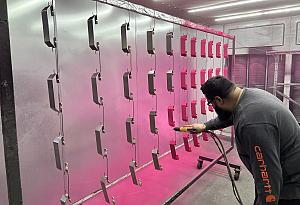- FMA
- The Fabricator
- FABTECH
- Canadian Metalworking
Categories
- Additive Manufacturing
- Aluminum Welding
- Arc Welding
- Assembly and Joining
- Automation and Robotics
- Bending and Forming
- Consumables
- Cutting and Weld Prep
- Electric Vehicles
- En Español
- Finishing
- Hydroforming
- Laser Cutting
- Laser Welding
- Machining
- Manufacturing Software
- Materials Handling
- Metals/Materials
- Oxyfuel Cutting
- Plasma Cutting
- Power Tools
- Punching and Other Holemaking
- Roll Forming
- Safety
- Sawing
- Shearing
- Shop Management
- Testing and Measuring
- Tube and Pipe Fabrication
- Tube and Pipe Production
- Waterjet Cutting
Industry Directory
Webcasts
Podcasts
FAB 40
Advertise
Subscribe
Account Login
Search
Industry economist says nearshoring strategy will boost U.S. manufacturing jobs
- October 24, 2011
- News Release
- Shop Management
The phenomenon of nearshoring — the relocation of manufacturing production to countries that provide less expensive production processes and are closer to the end consumer — offers the potential for a mass return of jobs from China to the North American market and will get under way sooner rather than later, says a manufacturing sector economist.
"A new study from the Boston Consulting Group (BCG) posits that some 3 million jobs will return to the U.S. thanks to nearshoring," said Dr. Chris Kuehl, economic analyst for the Fabricators & Manufacturers Association, Intl. (FMA).
In the current economic update newsletter Fabrinomics published by FMA, Kuehl reports the BCG study cites three factors expected to drive this process — the rising costs of production in China, the rising costs of transportation, and the improved efficiency and productivity in the U.S. and Europe.
"The first of these factors has become a major concern for the Chinese as there is no way to reverse that trend without creating some serious social unrest in China," Kuehl said. "Wages and salaries have been going up fast in China — estimates are that wages have risen by more than 1,000 percent in the coastal regions just in the last year or so.
"The Chinese are losing the cheap manufacturing sector to rivals in other parts of Asia and to the Latin nations like Mexico, where wages have risen by less than 25 percent. The BCG study shows that costs of production in China are going to rise inexorably in the coming years."
In terms of reduced transportation costs, Kuehl said it's not just a matter of how much additional fuel is needed to ship goods from Asia to the markets in Europe and the U.S., though that is an expense that will keep rising as energy costs go up.
"There also is the supply chain issue of speed and accuracy," he explained. "It is far less reliable to ship by ocean cargo than by rail or truck, which gives an advantage to the producers that are on the same continent as their consumers."
The third key factor for the return of production through nearshoring: the improvement in the productivity in the U.S.
"The revolution in manufacturing is in technology and robotics, and it has been taking place for some time," Kuehl says. "The U.S. manufacturer employs far fewer people than in the past, but the output is setting records. This has allowed the U.S. to compete globally for manufacturing business and it has allowed many in the U.S. sector to regain some business from overseas suppliers."
Kuehl noted the BCG study suggests that the U.S. can recapture jobs simply through attracting these manufacturers back to the U.S. and by encouraging new manufacturers to set up in the U.S.
"The inhibitions at this stage are seen as more political than economic," he added. "If the U.S. continues to approach trade in a hostile manner, the advantages will be wasted. If the regulations continue to discriminate against the manufacturer, the advantage will dissipate as well.
"The time for a careful examination of manufacturing in the U.S. is at hand," Kuehl asserted. "The nearshoring that is referenced by BCG can just as easily end up in Mexico and other Latin America countries as in the U.S. It will be up to the powers that be to make certain that the U.S. gets its share of returning business. They also need to be able to get engaged with the business coming back to Mexico and other natural U.S. trading partners."
Rockford, Ill.-based Fabricators & Manufacturers Association, International (FMA) is a professional organization with nearly 2,300 members working together to improve the metal forming and fabricating industry. Founded in 1970, FMA brings metal fabricators and fabricating equipment manufacturers together through technology councils, educational programs, networking events, industry trade publications and the FABTECH® trade show. FMA also has two technology affiliates: the Tube & Pipe Association, International (TPA), which focuses on the unique needs of companies engaged in tube and pipe producing and fabricating, and the Green Manufacturer Network (GMN) which serves the employees of companies that are focused on improving their utilization of green technologies.
Related Companies
subscribe now

The Fabricator is North America's leading magazine for the metal forming and fabricating industry. The magazine delivers the news, technical articles, and case histories that enable fabricators to do their jobs more efficiently. The Fabricator has served the industry since 1970.
start your free subscription- Stay connected from anywhere

Easily access valuable industry resources now with full access to the digital edition of The Fabricator.

Easily access valuable industry resources now with full access to the digital edition of The Welder.

Easily access valuable industry resources now with full access to the digital edition of The Tube and Pipe Journal.
- Podcasting
- Podcast:
- The Fabricator Podcast
- Published:
- 04/09/2024
- Running Time:
- 63:55
In this podcast episode, Brian Steel, CEO of Cadrex Manufacturing, discusses the challenges of acquiring, merging, and integrating...
- Industry Events
16th Annual Safety Conference
- April 30 - May 1, 2024
- Elgin,
Pipe and Tube Conference
- May 21 - 22, 2024
- Omaha, NE
World-Class Roll Forming Workshop
- June 5 - 6, 2024
- Louisville, KY
Advanced Laser Application Workshop
- June 25 - 27, 2024
- Novi, MI






























